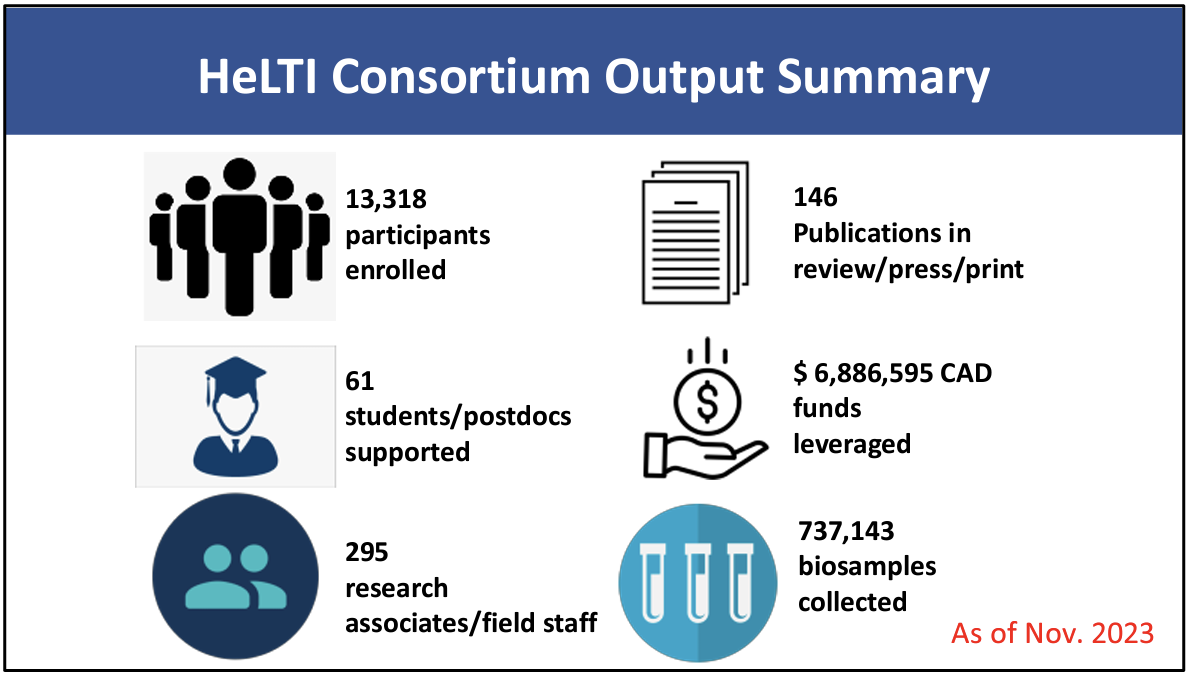
The Healthy Life Trajectories Initiative (HeLTI)

The Healthy Life Trajectories Initiative (HeLTI) is an international consortium formed as a ten-year initiative funded jointly by the Canadian Institutes of Health Research, Department of Biotechnology (India), Medical Research Council (South Africa) and the National Natural Science Foundation (China), and in collaboration with the World Health Organization (WHO) to address the increasing burden of non-communicable diseases (NCDs) around the world.
HeLTI uses the Developmental Origins of Health and Disease (DOHaD) approach, which is based on the notion that environmental factors interact with genes during conception, fetal life, infancy and early childhood, and that this programming affects the individual’s health later in life. Harmonized studies are implemented in four countries to test if an integrated continuum of care intervention starting pre-conception and continued across the pregnancy, infancy and childhood phases will reduce childhood adiposity, impact maternal health and ultimately improve child development.
In each of these countries, longitudinal multi-sectoral lifestyle interventions will be initiated during the preconception phase and then tailored to respond to the specific needs of the family during pregnancy, infancy and early childhood. Time sensitive interventions will aim, amongst others, at promoting healthy pre-pregnancy behaviors, optimizing maternal health, preventing maternal depression, enhancing home environment, supporting exclusive breastfeeding, encouraging child health behaviors, and promoting nurturing parental care. Recognizing the context and specificities, including the diversity of lifestyle patterns across populations, the four studies are designed to meet the respective needs of the local population but yet are prospectively harmonized through the development of common research, measurements, and data collection protocols to allow comparative evaluation.
Background
The rising problem of obesity and non-communicable diseases
Non-communicable diseases (NCDs), including cardiovascular disease (CVD), type 2 diabetes mellitus and mental illness - especially depression - are major global contributors to premature death and disability. However, their prevalence and trends vary between countries. In Canada, overweight and obese states are found in 70% of men and 60% of women, and are creeping into younger age groups, thus forecasting serious economic, societal and personal consequences. Today, over 25% of children in Canada are overweight or obese.
While NCDs were previously most common in high-income western countries and rare in low- and middle-income countries (LMICs), they are now plateauing or falling in the former and rapidly increasing in the latter. There are about 166 million people with diabetes in China and India combined (40% of the world’s total). Depression is the leading neuropsychiatric cause of disease burden globally and in LMICs, and by 2020 it is projected to be the second leading cause of burden of disease5.
Rates of antenatal and postnatal depression in LMICs are higher than in high-income countries, with estimates of 16% and 19% respectively. Adiposity increases NCD risk, and the epidemics of CVD and diabetes in LMICs have emerged with greater economic development, urbanisation, obesogenic lifestyles, and high and rising rates of overweight and obesity (OWO). OWO affects 30-40% of Chinese adults and South African men, and over 60% of South African women. Prevalence is lower in India (about 20%), where underweight remains more common, though high rates are present in urban and high socio-economic groups. OWO is not the only driver for rising trends in NCDs. While OWO prevalence is lower in LMICs than in high-income countries, NCD rates are comparable or higher. High rates of diabetes and hypertension are reported even in rural areas and at relatively low BMI.
Developmental origins of obestiy and NCDs
Intrauterine and early infancy exposures appear to influence a person’s risk of adult-onset chronic diseases, including cardiometabolic disorders, which is the core premise of the developmental origins of health and disease (DOHaD) hypothesis. Poor maternal nutrition in pregnancy can lead to fetal growth restriction and predispose to cardiometabolic diseases in adulthood (e.g. diabetes, hypertension). Low birth weight and in utero exposure to maternal diabetes, hypertension and obesity are each associated with elevated blood pressure, plasma glucose, insulin, and lipid concentrations in children at age 5 years. These childhood risk markers are known to track into adult life and predict disease.
Some well-studied exposures in pregnancy or early infancy have long-term consequences, known as developmental programming. These include: 1) maternal obesity; 2) gestational diabetes mellitus (GDM); 3) maternal smoking; 4) formula feeding in infancy; and 5) fetal/infant exposure to stress or parental depression. High levels of maternal stress/anxiety have been linked to increased risk for anxiety disorders, attention deficit hyperactivity disorder, conduct disorder, increased body mass index (BMI), insulin resistance, reduced cognitive performance, 3 schizophrenia and altered function of stress response systems in children; and in many cases these effects are sex-specific.
DOHaD research also suggests that NCD risk is not only influenced by exposure to ‘load’ factors such as adult obesity and inactivity, but also by the ‘capacity’ of key metabolic tissues, which is acquired during early development. Cohort studies have shown that higher BMI at 1-2 years of age is associated with a lower CVD and diabetes risk in adult life, suggesting that, like fetal life, infancy is a period of continuing developmental vulnerability. In contrast, BMI gain after this time (childhood, adolescence and adult life) even in the absence of frank obesity is associated with increased NCD risk. In all populations, the highest risk of CVD and diabetes, and the most adverse cardio-metabolic risk markers, are in men and women who were light and thin at birth and in infancy, but gained the greatest BMI as children or adults. It is now known that early life exposures other than undernutrition lead to metabolic programming, and that disorders other than CVD and diabetes have early life origins.
Mechanisms of programming
Parental anxiety and depression can impact the quality of infant and child care, which is integral to improving cognitive function and other health outcomes later in life. Children who receive a low quality of care are more sensitive to the effects of stress and display more behavioral problems. These poor outcomes are especially pronounced in children who have a genetic predisposition to environmental influence. The early environment can also impact brain structure. Early deprivation (neglect, maltreatment, abuse, etc.) can lead to changes in the shape and volume of various brain structures in children and adults. Regions that are involved in learning and memory, as well as communication between different parts of the brain are particularly sensitive.
